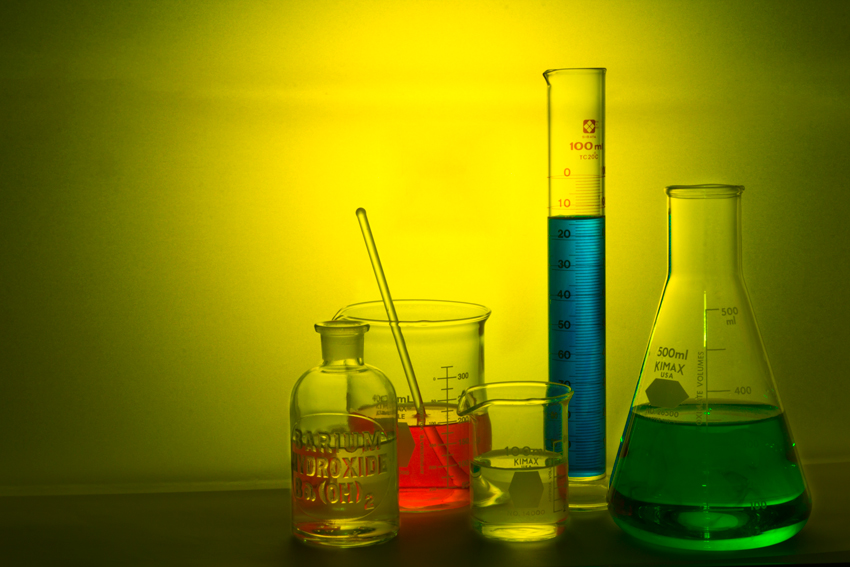GCSE
The course begins with Unit 1 and a study of Atomic Structure, Periodic Table and Structure, Bonding and Properties of substances before dealing with some quantitative aspects of chemistry. An introduction to the chemistry of Acids, Bases and Salts follows before a section reviewing Water, Solubility and the Testing of Ions in solution. The year finishes with a further treatment of Chemical Quantities with a particular emphasis in titrations and calculations for reactions that occur in solution.
There is a heavy emphasis on Careers in Chemistry embedded throughout the Year course which pupils will become increasingly aware of as they progress.
Year 12 starts with a continuation of Unit 2 with a study of rates of reaction before pupils go onto discuss types of chemical reaction, initially focusing on metal reactivity before continuing with a full treatment of the chemistry of non-metals. There is considerable emphasis on the industrial applications of this chemistry and as a consequence: Careers in Chemistry. The year finishes with a more detailed exploration of Organic Chemistry.
Course Structure Examination Board CCEA
Assessment
Unit 1: Structures, Trends, Chemical Reactions and Analysis
- 1 hour 15 minutes
- worth 35% of GCSE
Unit 2: Further Chemical Reactions, Organic Chemistry and Materials
- 1 hour 30 minutes
- worth 40% of GCSE
A range of question types will be used, including multiple-choice, short answer and questions that require extended responses.
Extended response questions will allow students to demonstrate their ability to construct and develop a sustained line of reasoning which is coherent, relevant, substantiated and logically structured. Extended responses may be in written English, extended calculations, or a combination of both, as appropriate to the question
Chemistry is an experiment based subject and considerable emphasis is placed on experimentation: carrying out investigative, preparative and analytical practicals and explaining observations with new found knowledge.
Practical Assessment
Unit 3: Booklet A (carried out in the laboratory)
- 2 hours
- worth 7.5% of GCSE
Unit 3: Booklet B (carried out in the examination hall)
- 1 hour
- worth 17.5%
Maths Requirements
A minimum of 20% of marks in the written papers will test maths skills, including multi-step and open calculations, use of decimals and translation of graphs.
Quantitative chemistry are key concepts in the specification. They are important principles in chemistry and may be assessed in both of written papers.
Grading
Students will receive a lettered grades A* to G.
Year 11 Chemistry (7 or 8 periods per week)
The current Year 11 study chemistry for 8 periods per week (ppw) or 7 ppw depending on timetable block. There are six sets in Year 11 which will continue, normally with the same teacher into Year 12 leading to a CCEA GCSE Chemistry award (as a separate science). There is presently no provision for Double Award Science.
The year begins with Unit 1 and a study of Atomic Structure, Periodic Table and Structure, Bonding and Properties of substances before dealing with some quantitative aspects of chemistry. An introduction to the chemistry of Acids, Bases and Salts follows before a section reviewing Water, Solubility and the Testing of Ions in solution. The year finishes with a further treatment of Chemical Quantities with a particular emphasis in titrations and calculations for reactions that occur in solution. There are two examinations in this year. The first is at the start of the Spring term in January and the second is towards the end of the Summer Term. There are tests and common homework tasks at the end of each topic. Google Classroom is used to set some homework and classwork as appropriate as well as to supply enrichment activities and resources. There is a heavy emphasis on Careers in Chemistry embedded throughout the Year course which pupils will become increasingly aware of as they progress.
Year 12 Chemistry (7 or 8 periods per week)
The year starts with a continuation of Unit 2 with a study of rates of reaction before pupils go onto discuss types of chemical reaction, initially focusing on metal reactivity before continuing with a full treatment of the chemistry of non-metals. There is considerable emphasis on the industrial applications of this chemistry and as a consequence: Careers in Chemistry. The year finishes with a more detailed exploration of Organic Chemistry. There is time to revise key topics from previous years. There are two internal examinations at the start of the Spring term in January. This will be used as a ‘mock’ GCSE to inform pupils on the necessary work required for a successful entry for GCSE in the summer. The Controlled Assessment task will also take place during the first term of Year 12. There are tests and common homework tasks at the end of each topic. Google Classroom is used to set some homework and classwork as appropriate as well as to supply enrichment activities and resources.

